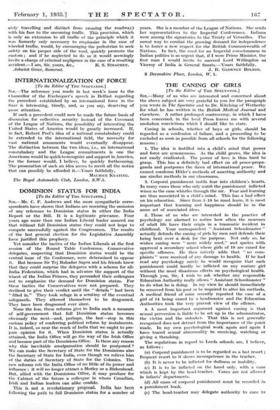DOMINION STATUS FOR INDIA
[To the Editor of THE SPECTATOR.] SIR,—Mr. C. F. Andrews and the more sympathetic corre- spondents have shown that Indians are resenting the omission of any .reference to Dominion status in either the India Report or the Bill. It is a legitimate grievance. Four years ago more than one Indian Liberal leader assured me that without full Dominion status they could not hope to compete successfully against the Congressmen. The results of the last general election for the Legislative Assembly have justified this prophecy.
Yet consider the tactics of the Indian Liberals at the first session of the Round Table Conference. Conservative delegates, suspecting that Dominion status would be the central issue of the Conference, were determined to oppose it,. But because Sir Tej Bahadur Sapru and his friends knew that they could surprise the delegates with a scheme for all- India Federation, which had in advance the support of the %wisest of the Indian Princes, they persuaded their colleagues not to emphasize the demand for Dominion status. For these tactics the Conservatives were not prepared. They declined to give their verdict until the " details " had been filled in." They took refuge in a scrutiny of the eventual safeguards. They allowed themselves to be dragooned. They have been dragooned ever since.
None the less, these reforms give to India such a measure of self-government that full Dominion status becomes obviously the next—and, perhaps, the last—step in this curious policy of conferring political reform by instalments. It is, indeed, so near the reach of India that we ought to pre- pare opinion for it. When Dominion status is actually attained, the India. Office will go the way of the Irish Office and become part of the Dominions Office. Is there any reason why this inevitable amalgamation should be postponed ? We can make the Secretary of State for the Dominions also the Secretary of State for India, even though we relieve him of the duties of Secretary of State for the Colonies. The new reforms rob the India Office of no little of its power and influence : it will no longer attract a Morley or a Birkenhead. But, allied with the Dominions Office, it may produce for the Cabinet of the future a colleague in whom Canadian, Irish and Indian leaders can alike confide.
This is not a revolutionary proposal. India has been following the path to full Dominion status for a number of years. She is a member of the League of Nations. She sends her representatives to the Imperial Conferences. Indians were among the signatories to the Treaty of Versailles. The surest way to combat the growing demand for independence is to foster a new respect for the British Commonwealth of Nations. In fact, the need for an Imperial consciousness in Indian politics is so urgent that, if I were Prime Minister, the first man I would invite to succeed Lord Willingdon as Viceroy of India is General Smuts.—Yours faithfully, J. R. GLORNEY BOLTON. 8 Devonshire Place, London, W. 1.














































 Previous page
Previous page